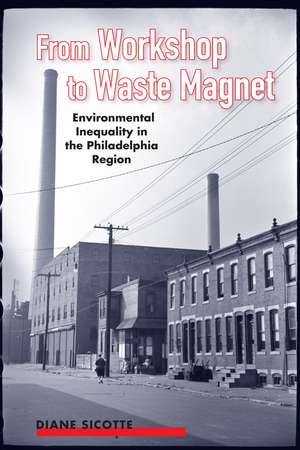From Workshop to Waste Magnet: Environmental Inequality in the Philadelphia Region: Nature, Society, and Culture
Autor Diane Sicotteen Limba Engleză Hardback – 20 sep 2016
Like many industrialized regions, the Philadelphia metro area contains pockets of environmental degradation: neighborhoods littered with abandoned waste sites, polluting factories, and smoke-belching incinerators. However, other neighborhoods within and around the city are relatively pristine. This eye-opening book reveals that such environmental inequalities did not occur by chance, but were instead the result of specific policy decisions that served to exacerbate endemic classism and racism.
From Workshop to Waste Magnet presents Philadelphia’s environmental history as a bracing case study in mismanagement and injustice. Sociologist Diane Sicotte digs deep into the city’s past as a titan of American manufacturing to trace how only a few communities came to host nearly all of the area’s polluting and waste disposal land uses. By examining the complex interactions among economic decline, federal regulations, local politics, and shifting ethnic demographics, she not only dissects what went wrong in Philadelphia but also identifies lessons for environmental justice activism today.
Sicotte’s research tallies both the environmental and social costs of industrial pollution, exposing the devastation that occurs when mass quantities of society’s wastes mix with toxic levels of systemic racism and economic inequality. From Workshop to Waste Magnet is a compelling read for anyone concerned with the health of America’s cities and the people who live in them.
Preț: 500.25 lei
Preț vechi: 1013.32 lei
-51% Nou
Puncte Express: 750
Preț estimativ în valută:
95.73€ • 99.34$ • 80.02£
95.73€ • 99.34$ • 80.02£
Carte indisponibilă temporar
Doresc să fiu notificat când acest titlu va fi disponibil:
Se trimite...
Preluare comenzi: 021 569.72.76
Specificații
ISBN-13: 9780813574202
ISBN-10: 081357420X
Pagini: 256
Ilustrații: 2 photographs, 18 maps, 2 figures, 25 tables
Dimensiuni: 152 x 229 x 23 mm
Greutate: 0.57 kg
Ediția:None
Editura: Rutgers University Press
Colecția Rutgers University Press
Seria Nature, Society, and Culture
ISBN-10: 081357420X
Pagini: 256
Ilustrații: 2 photographs, 18 maps, 2 figures, 25 tables
Dimensiuni: 152 x 229 x 23 mm
Greutate: 0.57 kg
Ediția:None
Editura: Rutgers University Press
Colecția Rutgers University Press
Seria Nature, Society, and Culture
Notă biografică
DIANE SICOTTE is an associate professor of sociology at Drexel University in Philadelphia, Pennsylvania, where she teaches courses on environmental justice.
Cuprins
Contents
List of Figures
List of Maps
List of Tables
Acknowledgements
Introduction
1 Measuring Environmental Inequalities in the Philadelphia Area in 2010
2 Theorizing Urban Environmental Inequality
3 The Rise of Industrial Philadelphia
4 Environmental Inequality from 1950 to 1969
5 From Workshop to Waste Magnet: Environmental Burdening After 1970
6 Intersectionality and Environmental Inequality in the Philadelphia Region
7 Toward a “Rustbelt” Theory of U.S. Environmental Inequality
Appendix
Notes
Index
Recenzii
"Strong, innovative, and timely, From Workshop to Waste Magnet beautifully demonstrates the necessity of understanding the dynamism of environmental inequality struggles. A truly important and ambitious book."
"From Workshop to Waste Magnet provides a rich analysis of how structures of class power and white privilege are the root causes of environmental inequality in Philadelphia. A critically important must-read for all those concerned with environmental justice."
“A richly layered study of hazardous waste and its many discontents … Sicotte's book offers a model multicausal analysis of environmental burdening. At one level, she shows that environmental burdens are spread across Philadelphia in ways that might encourage activists, business leaders, and politicians to work together and address common problems. At another level, she challenges scholars to refine their analyses of environmental justice in ways that highlight the intersection of class, ethnicity, and race. It is a timely and rewarding book."
Descriere
From Workshop to Waste Magnet presents Philadelphia’s environmental history as a bracing case study in mismanagement and injustice. Tracing the complex interactions among economic decline, federal regulations, local politics, and shifting ethnic demographics, sociologist Diane Sicotte uncovers how only a few communities came to host many types of polluting or waste disposal land uses. What she finds reveals the devastation that occurs when mass quantities of society’s wastes mix with toxic levels of systemic racism and inequality.
















